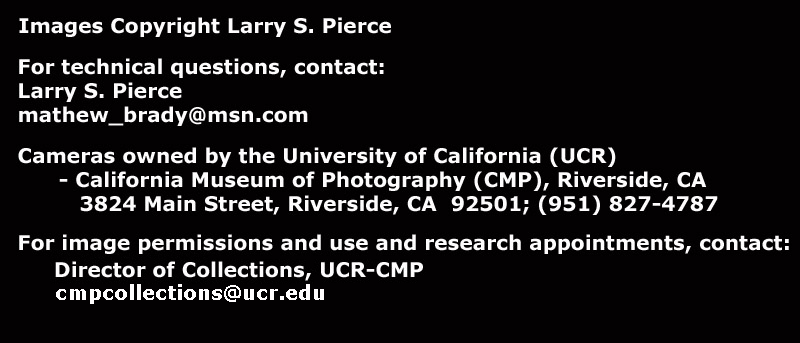American Optical Company
Scovill Mfg. Co., Prop'rs
Acme Reversible Back View Camera Variation 2.0
Example 1: 8 x 10";
Asssembly No. 10.
Given the short period over which this variation was made, apparently
just 1885, these two identical examples of the same size and having
assembly numbers 10 and 18, may have actually been made in the same
batch.
The camera finish has lightened as it aged. The upper sides of the
rear standard show a shadow in the finish shaped like the brass clip
attached there for >130 years.
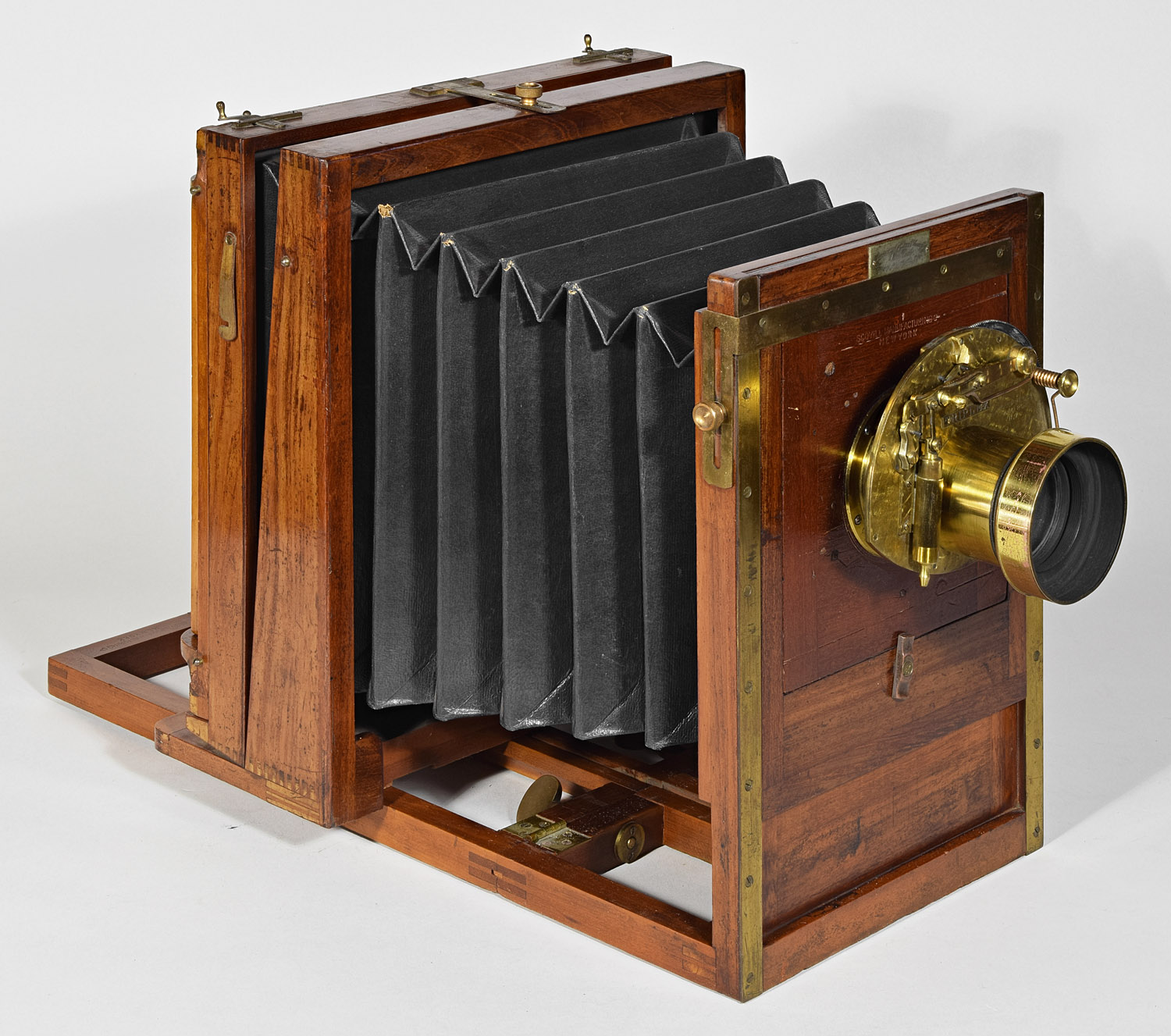
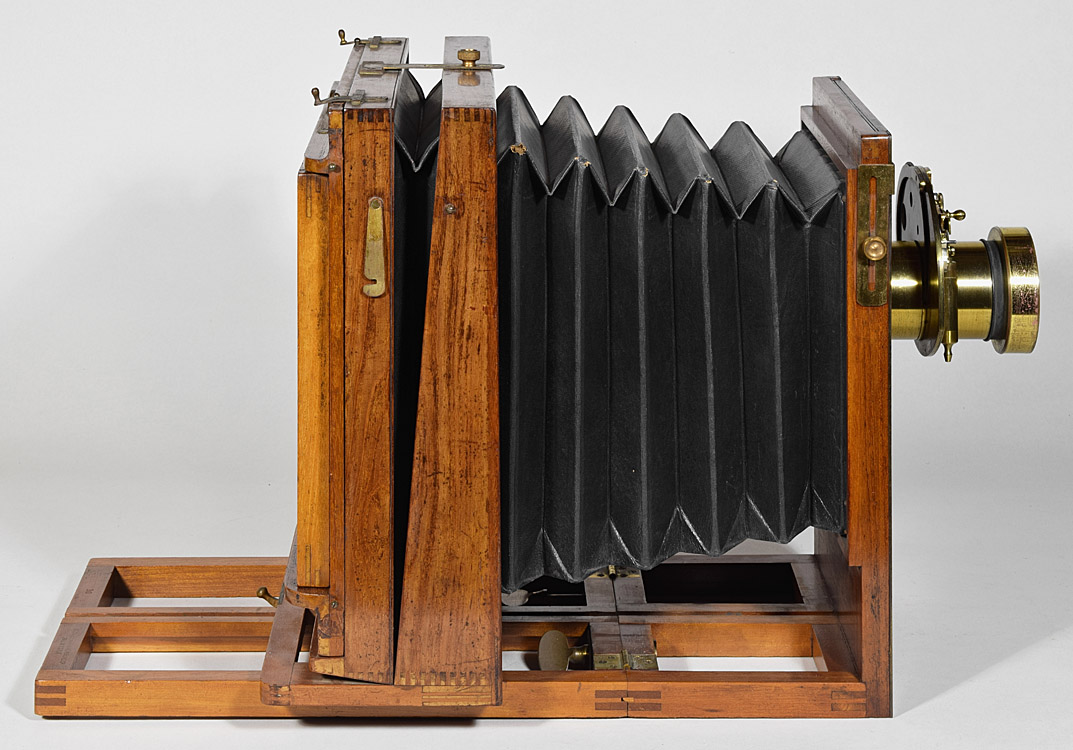
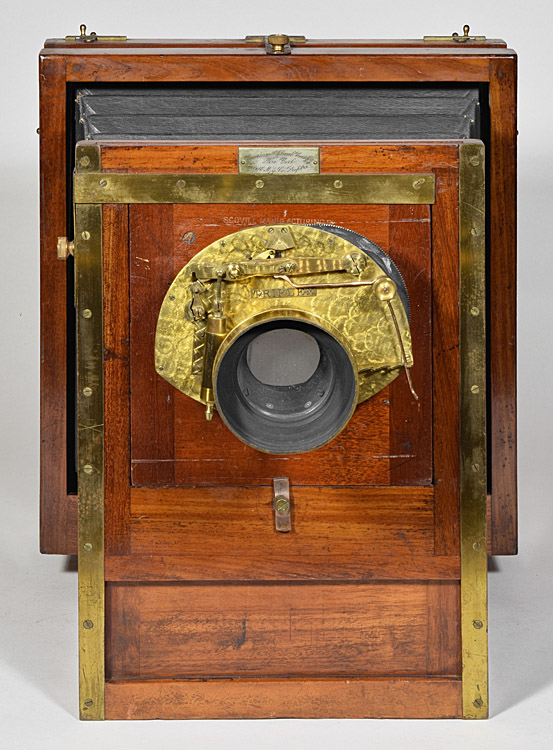
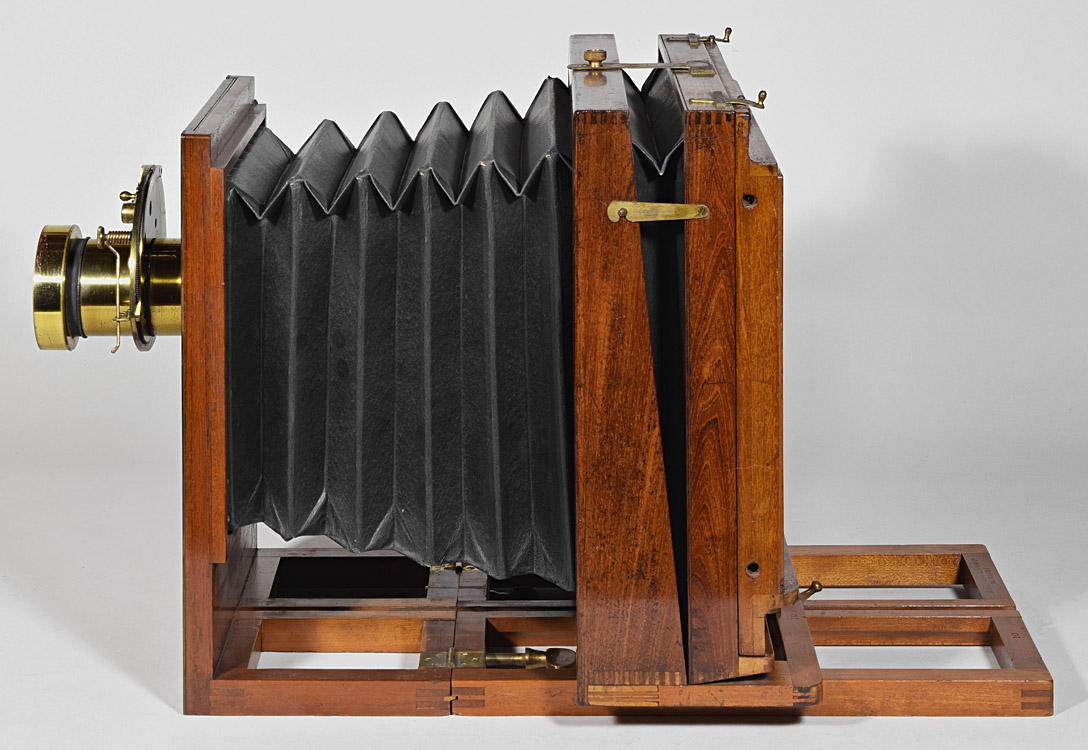
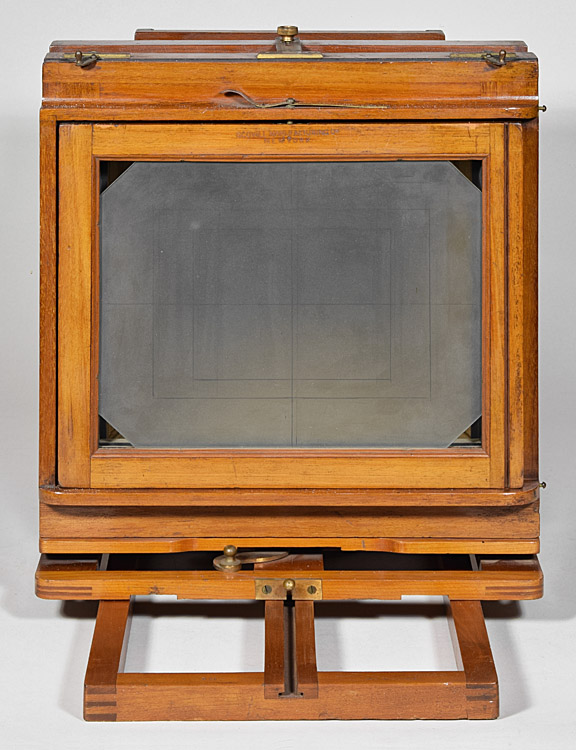
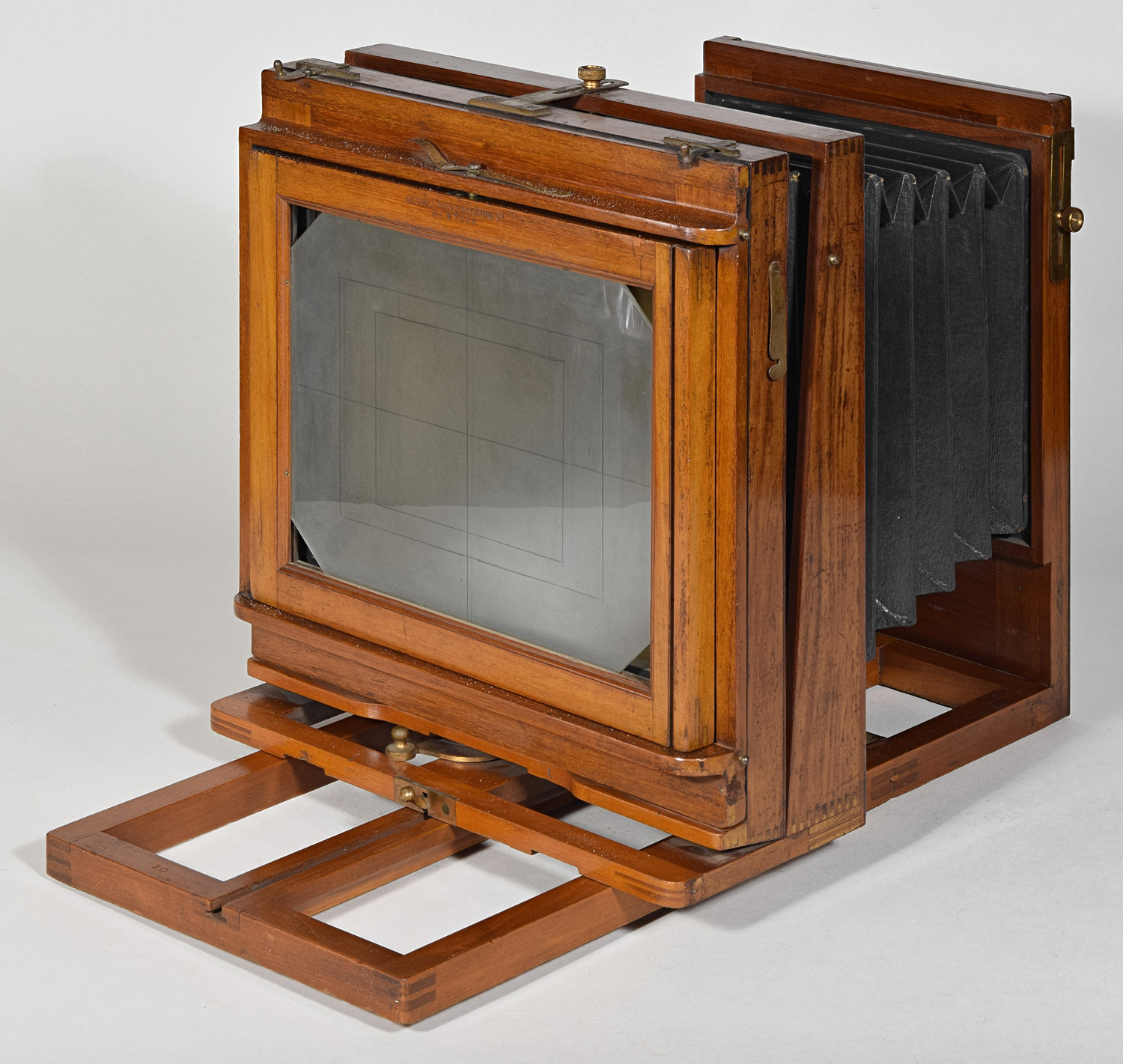
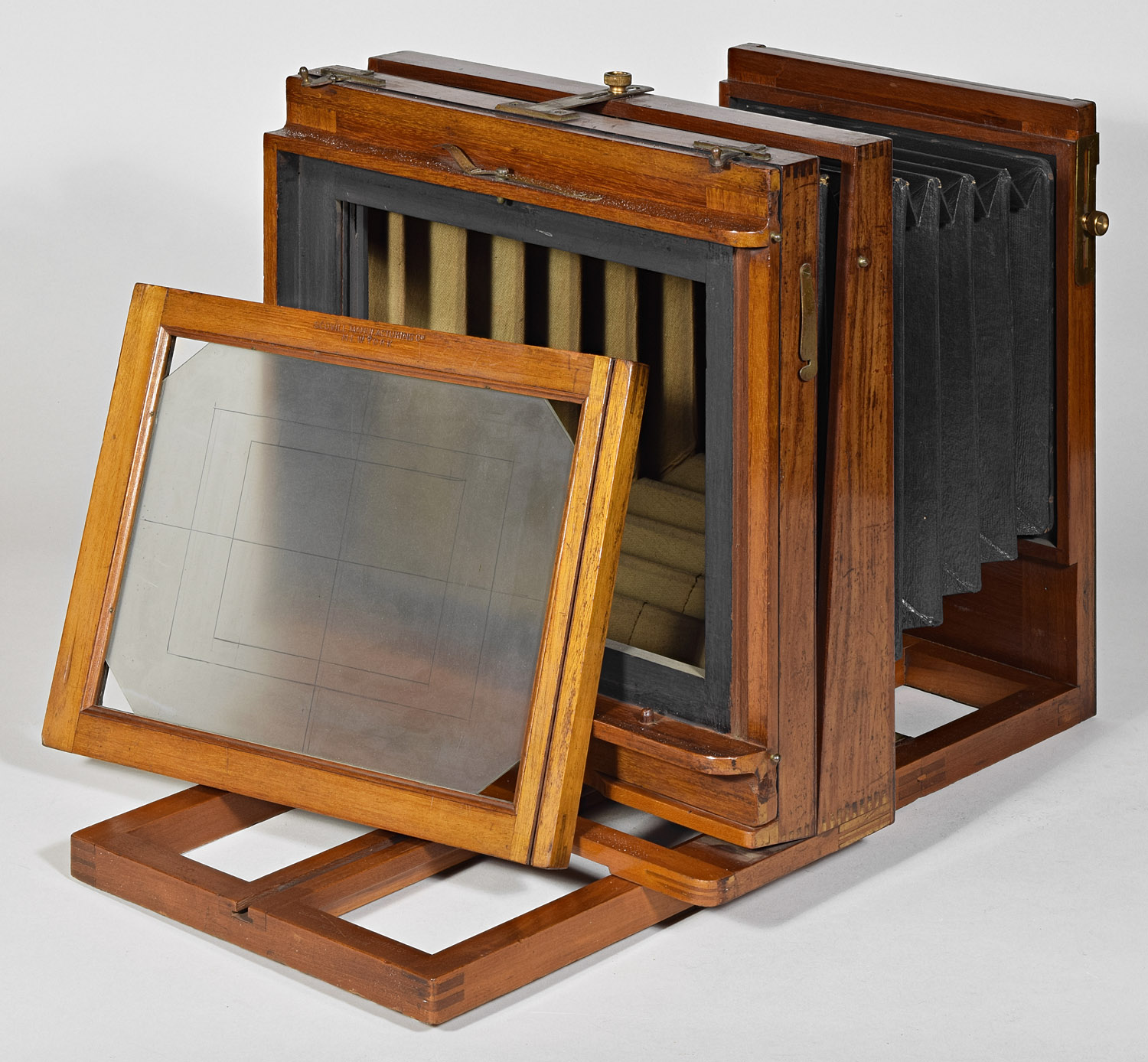
Bottom
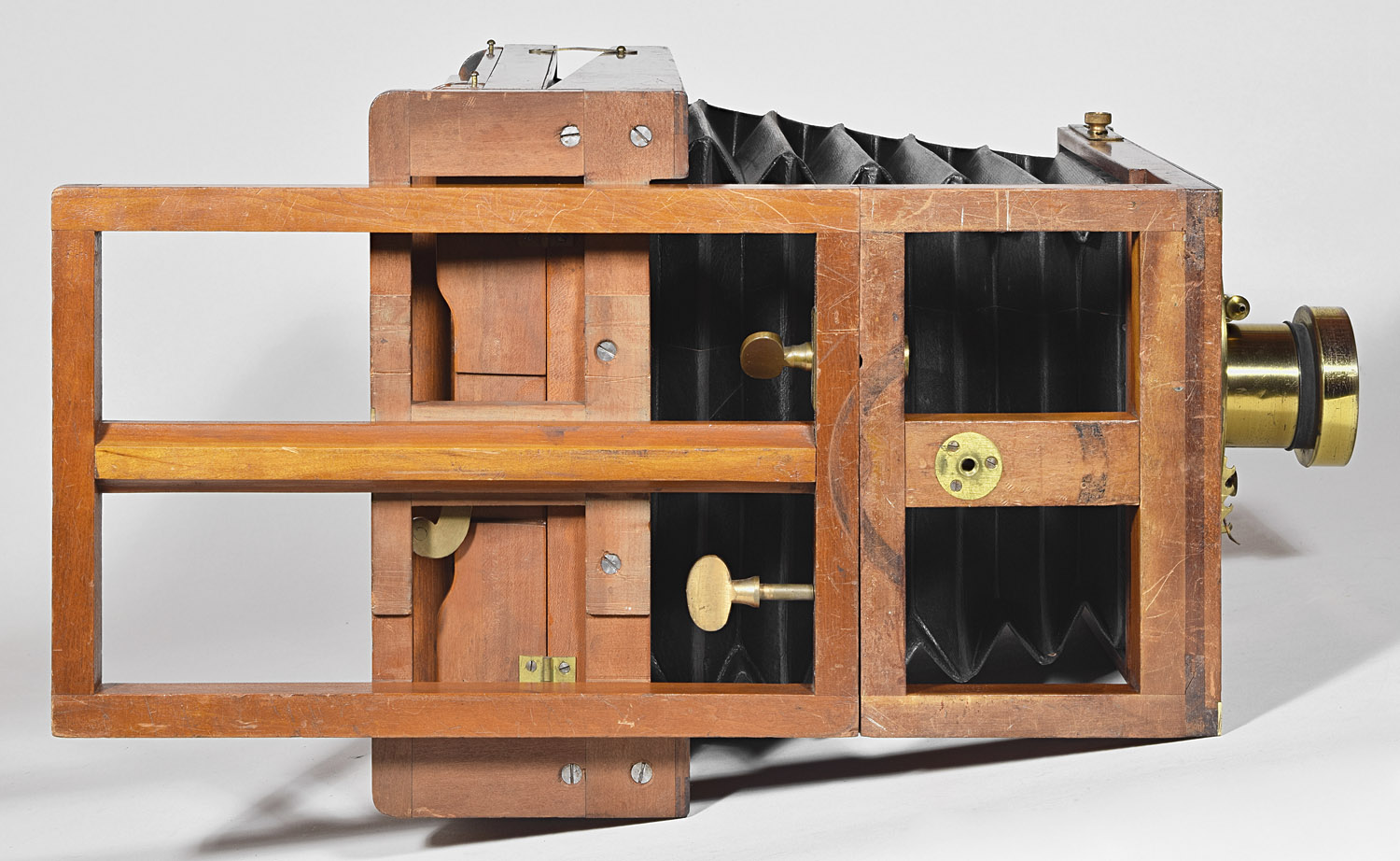
Top
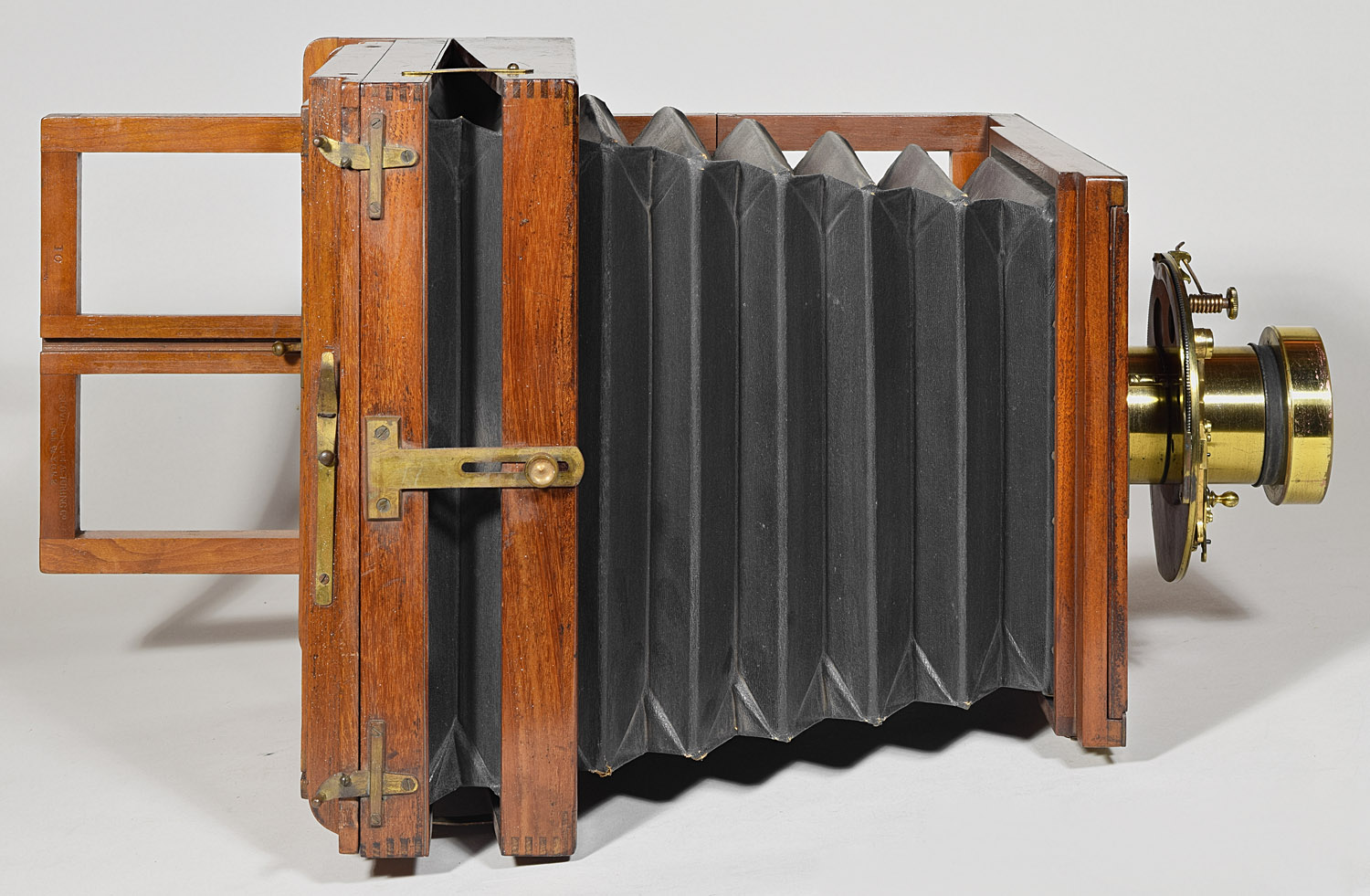
Label, silver metal, top of
front standard: "American Optical Comp'y - New York -
Scovill Mfg. Co., Propt'rs"
Stamp, top of lens board: "Scovill Manufacturing Co. / New
York". This stamp having rather large lettering and the
"Manufacturing" spelled out is found on early dry plate Scovill cameras
and accessories, such as a
5x8 example of
The 76 Camera
and a
stained 4x5 Ne Plus Ultra).
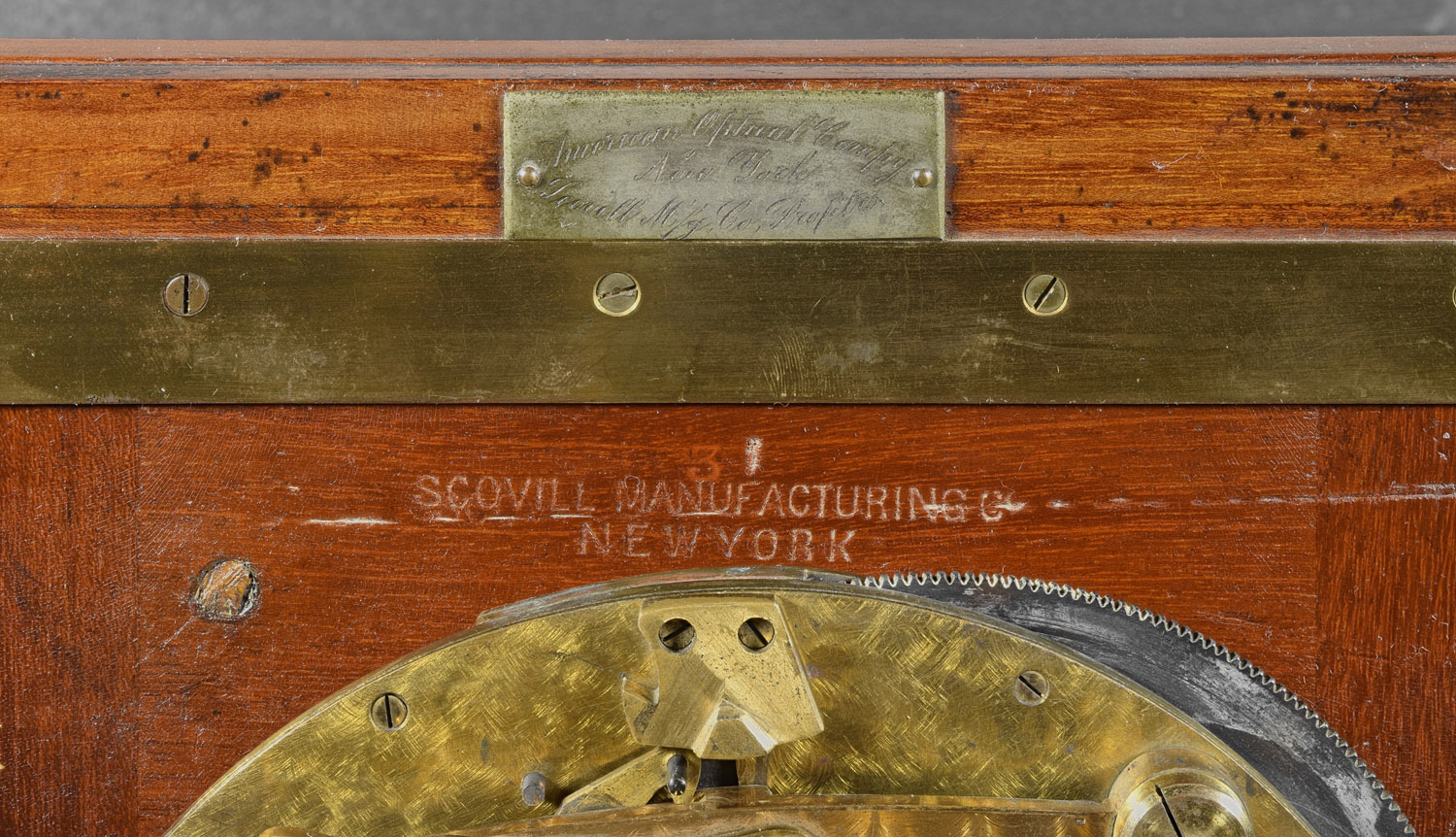
The same Scovill stamp
found on the lens board was also used on the top of the ground glass
frame.
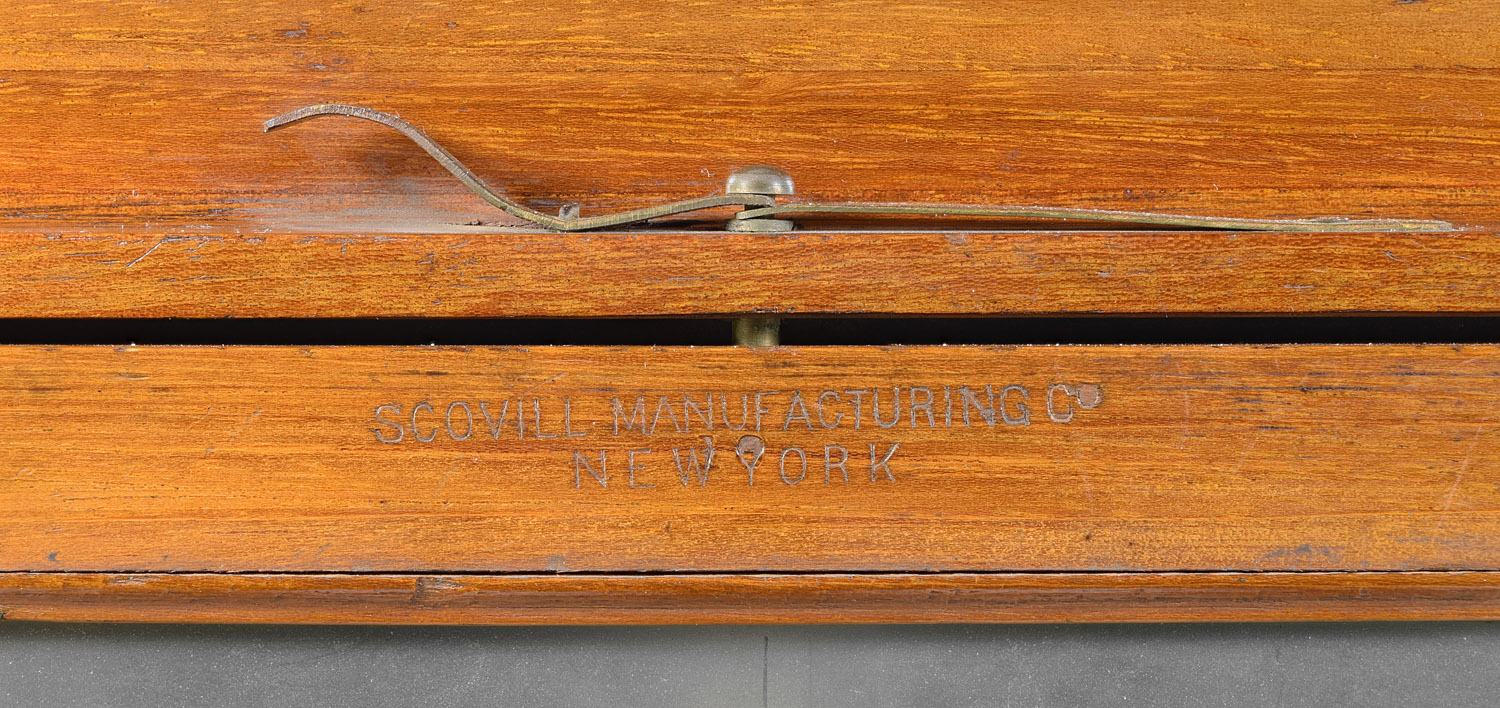
A third instance of the Scovill stamp is
on top of the folding platform.

Example 2: 8 x 10";
Assembly No. 18
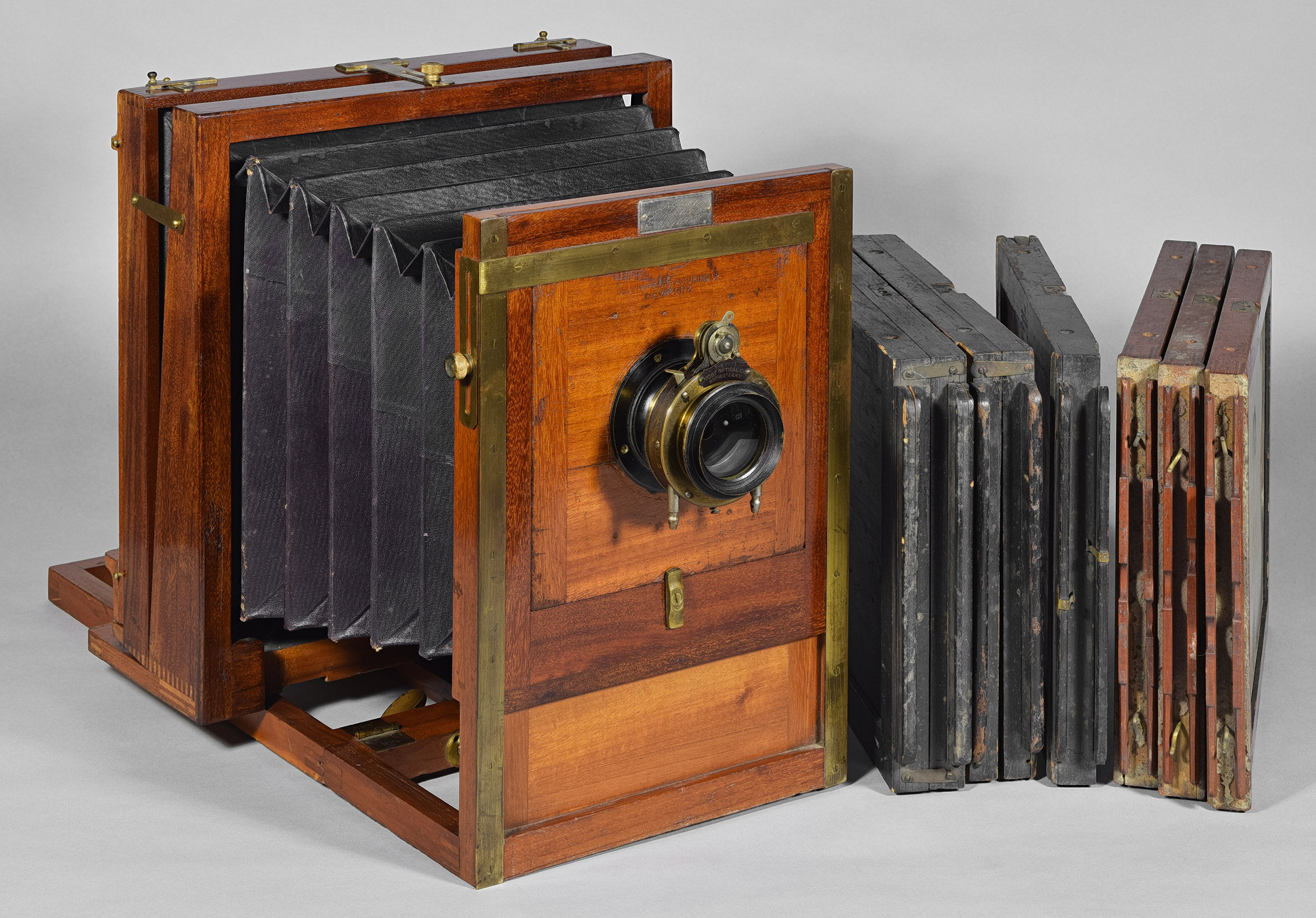
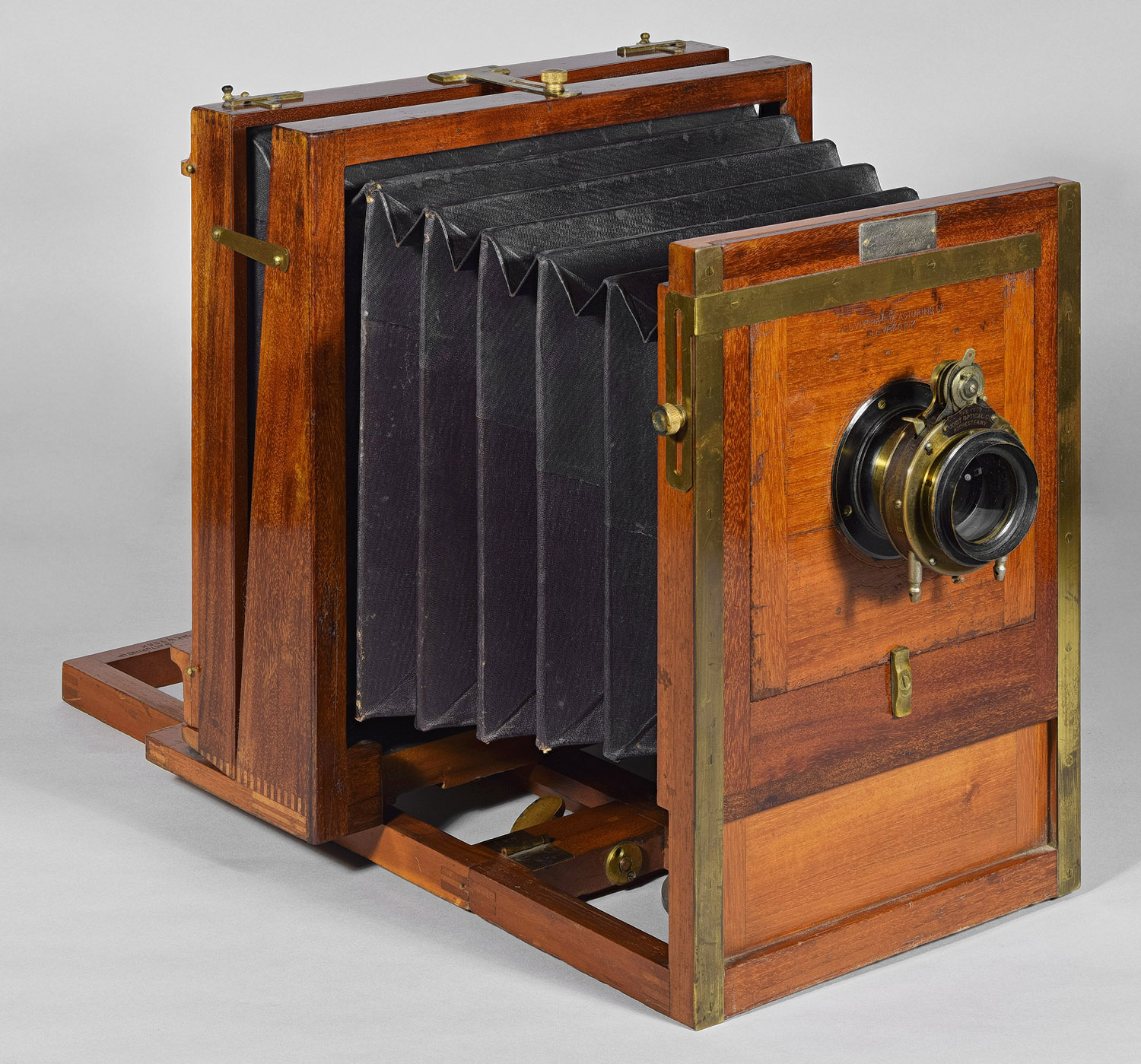
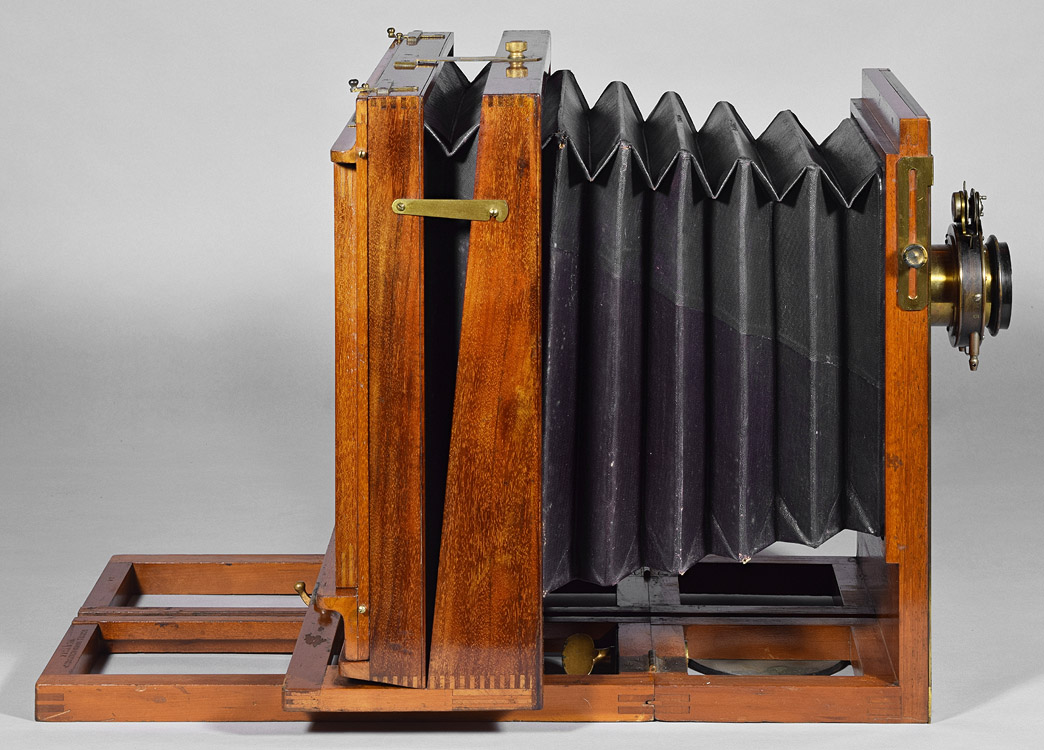
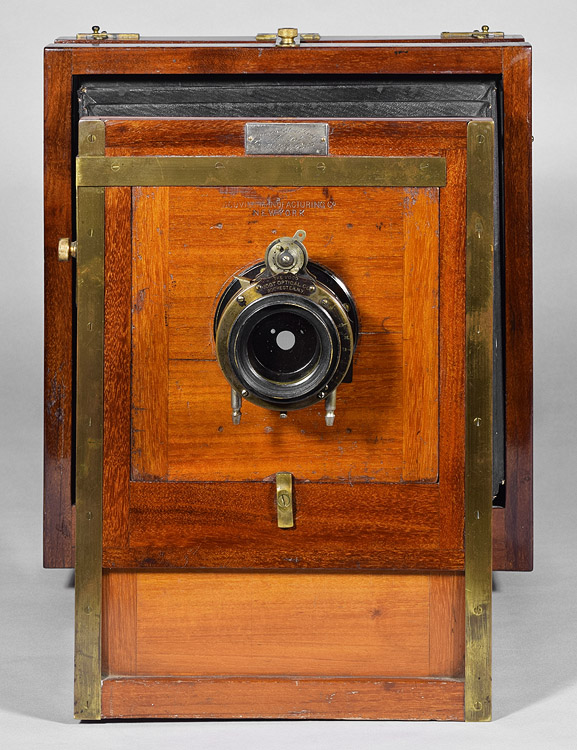
Note the shadow of
the brass clip in the wood finish at the upper side of the rear standard
(Below Left Image). Example 1 shows similar shadows in its ligh
finish.
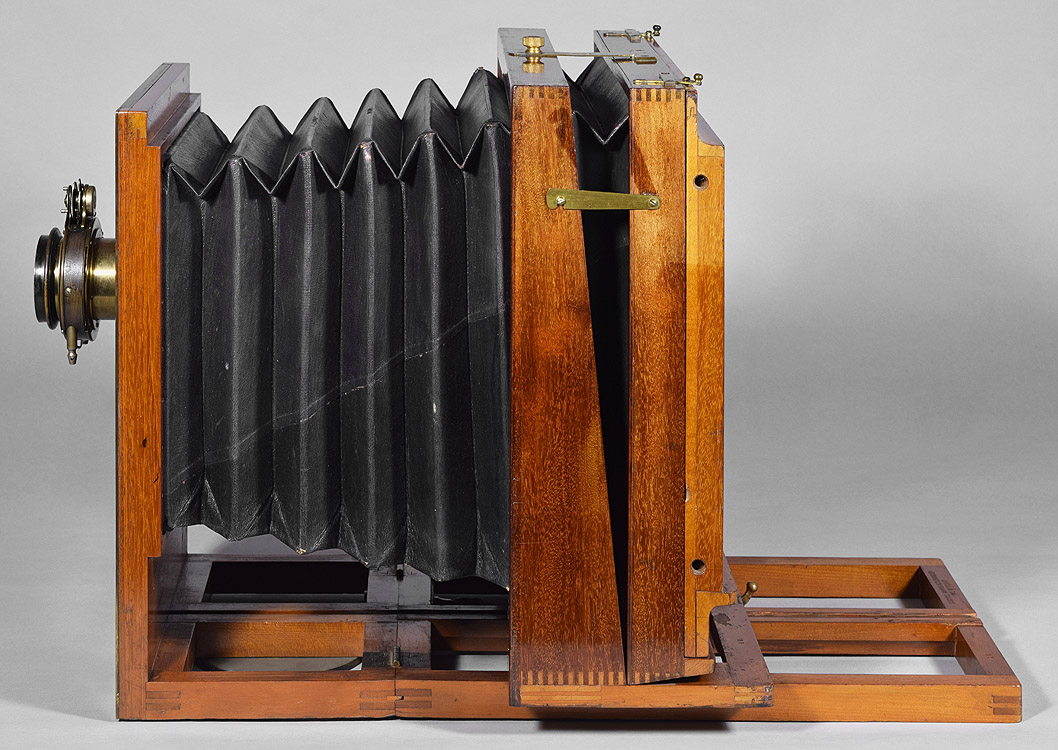
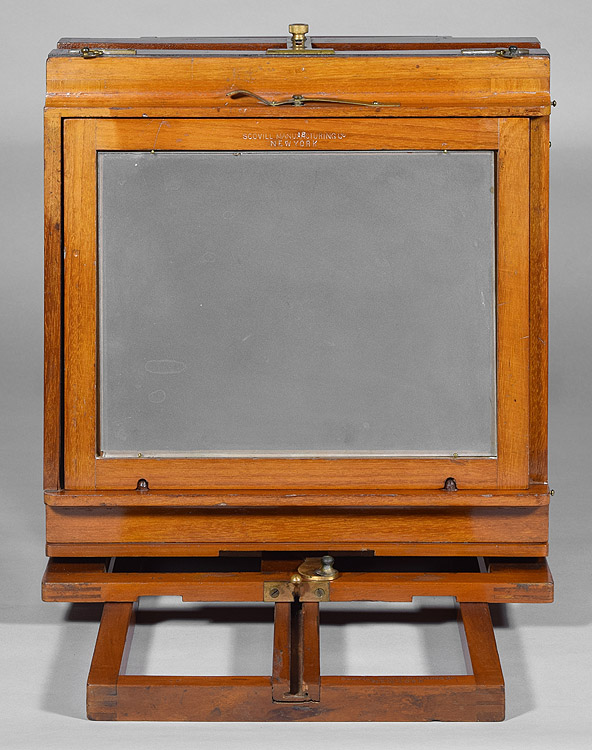
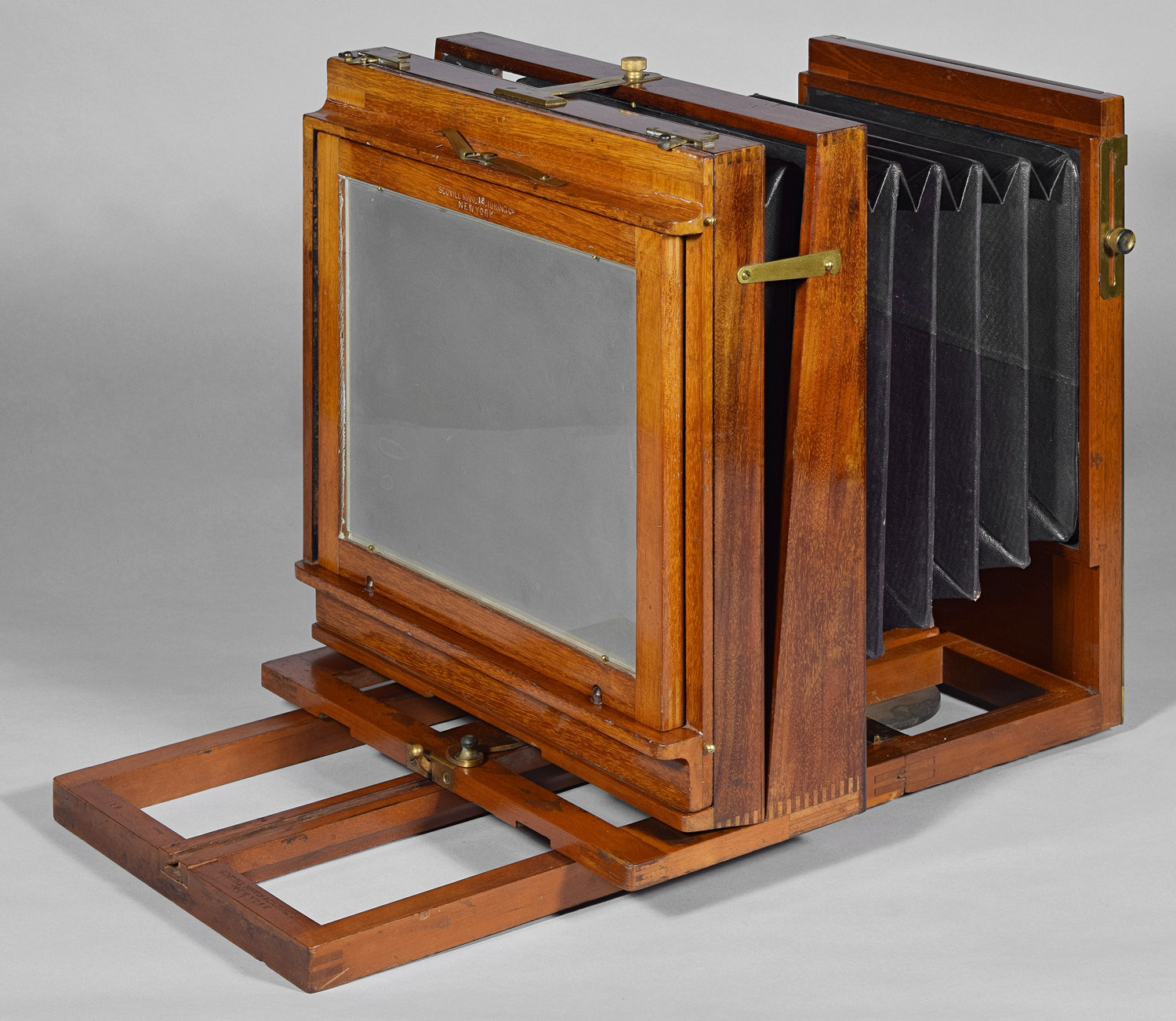
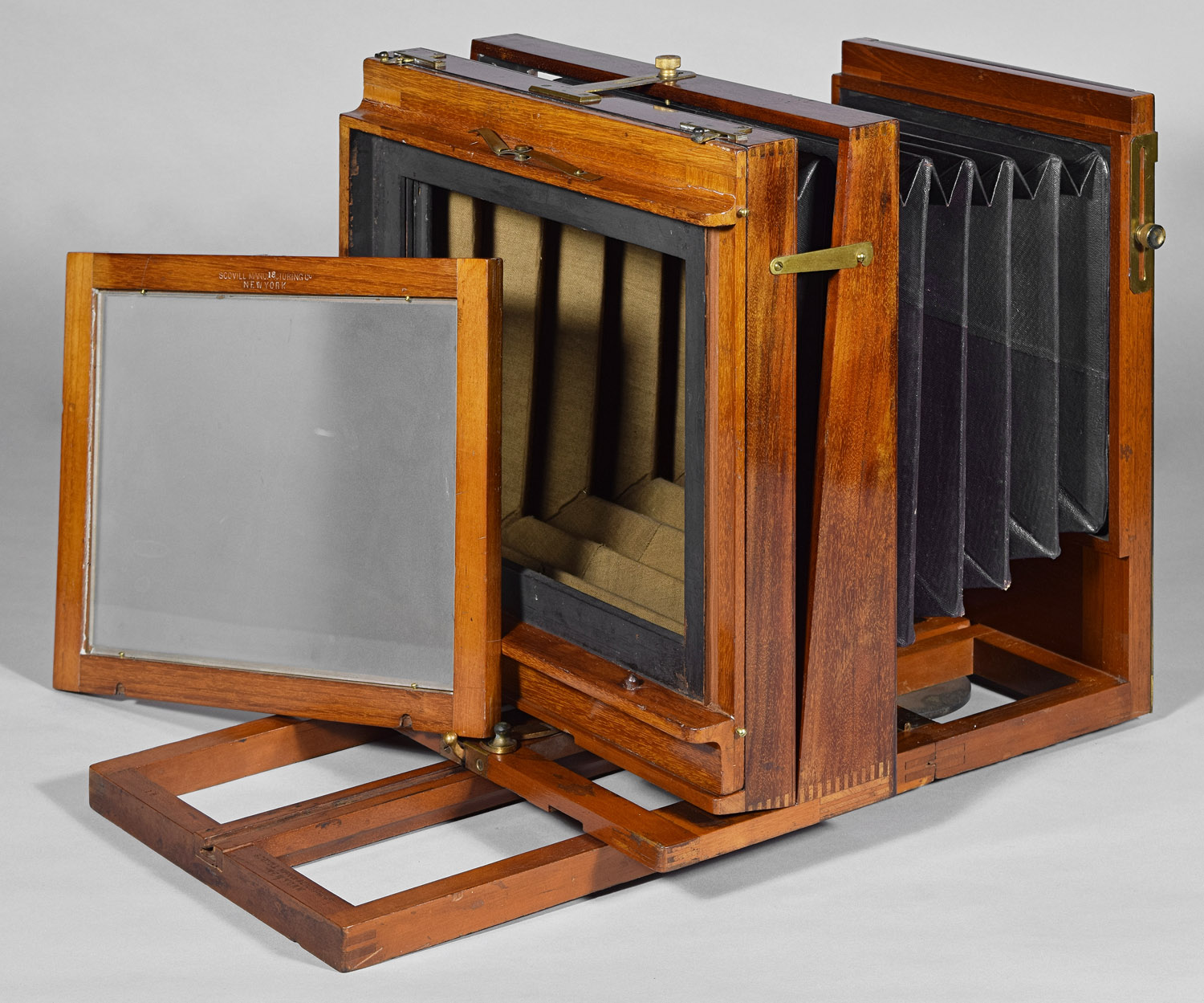
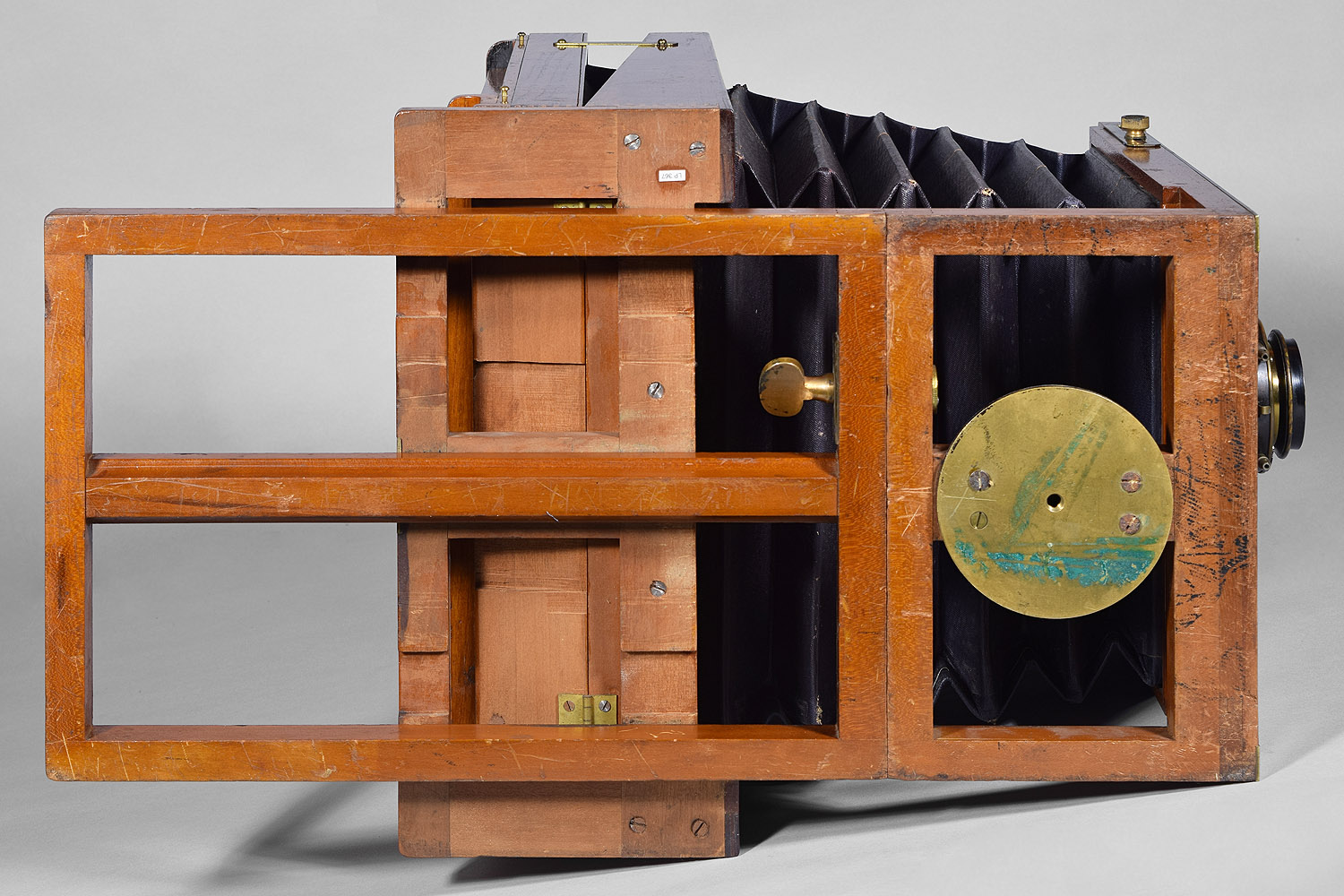
Label, silver metal, top of
front standard: "American Optical Comp'y - New York -
Scovill Mfg. Co., Propt'rs"
Stamp, top of lens board: "Scovill Manufacturing Co. / New
York". This stamp having rather large lettering and the
"Manufacturing" spelled out is found on early dry plate Scovill cameras
and accessories, such as a
5x8 example of
The 76 Camera
and a
stained 4x5 Ne Plus Ultra).

The same Scovill stamp
found on the lens board was also used on the top of the ground glass
frame. In addition, the serial or assembly number "18" was stamped
over the Scovill stamp, and also right next to it on the top of the
removable back.
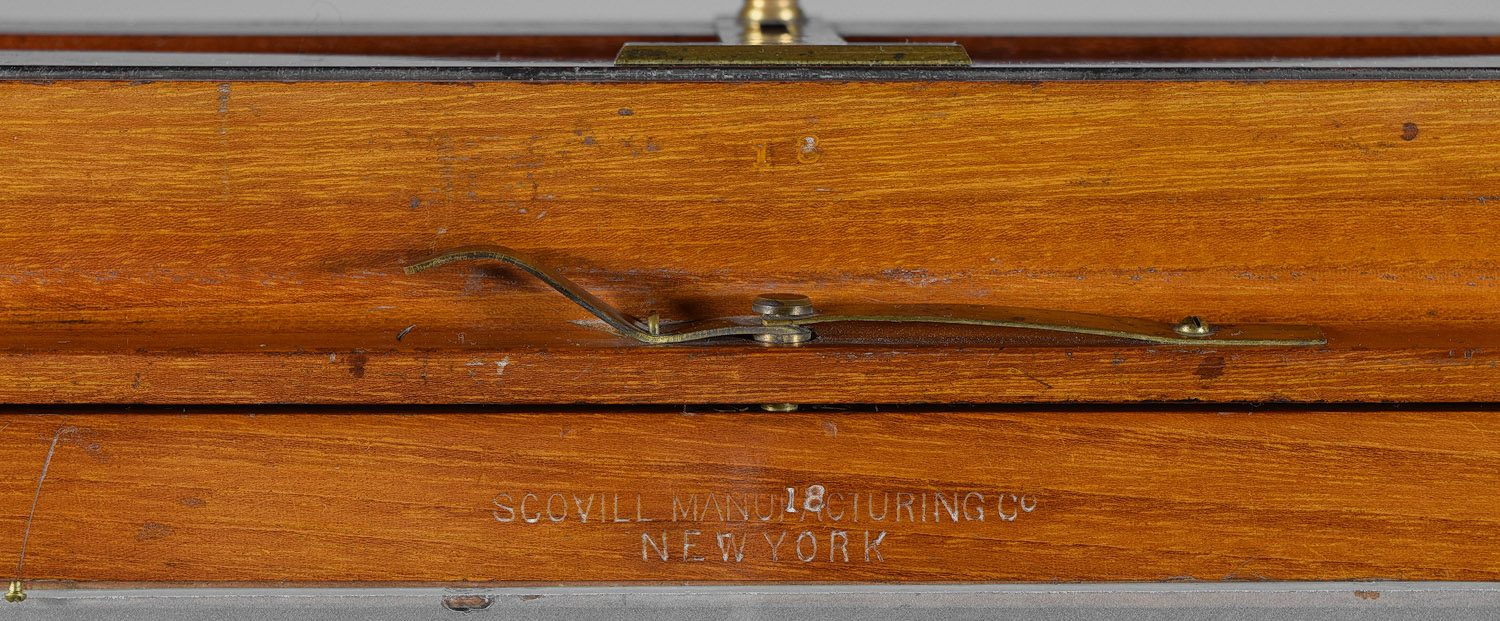
The serial or assembly
number "18" was also stamped on the top surface at the rear of the
platform/base. A third instance of the Scovill stamp is also there
on the right side.

All holders for this camera must
fit into the cavity left when the ground glass frame is removed.
This holder (shown from both sides), the only one of its design found
with the camera, re-loads via a pull-out system. It is 1 inch
thick.
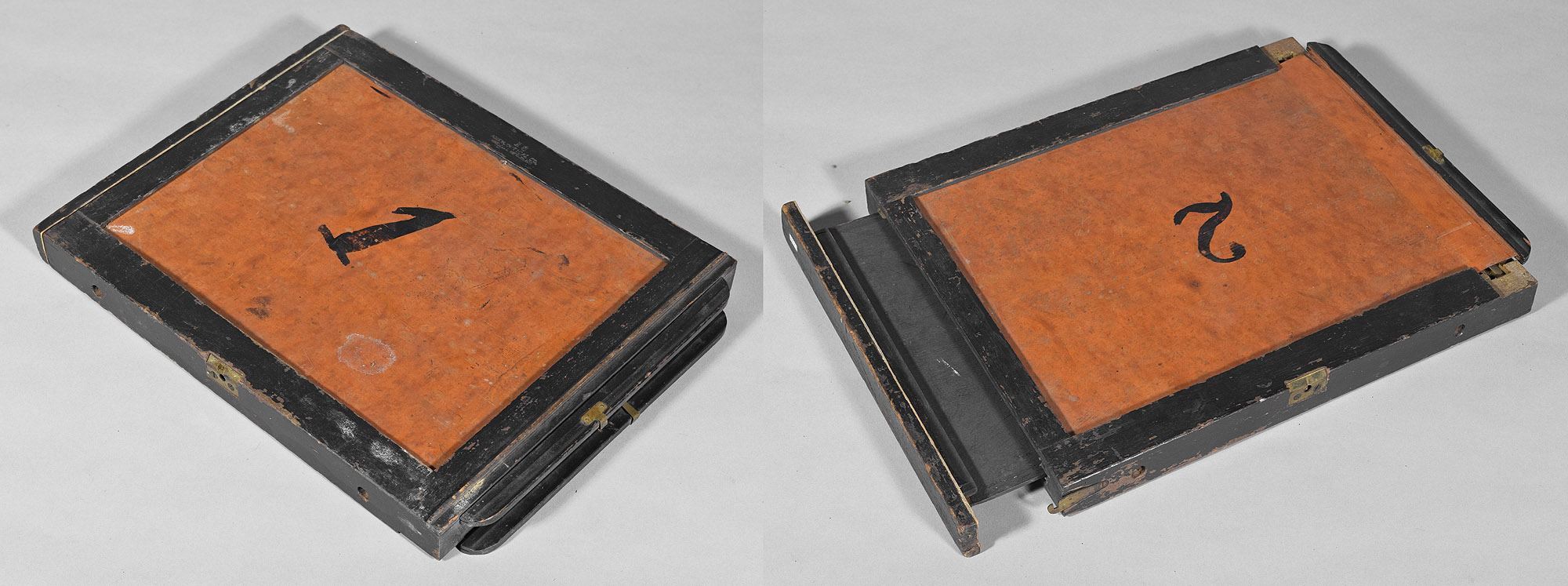
Two holders came with this
camera that re-load via a design known as "book-type": the two halves of
the holder open like a book. These are 1⅝ inches thick.
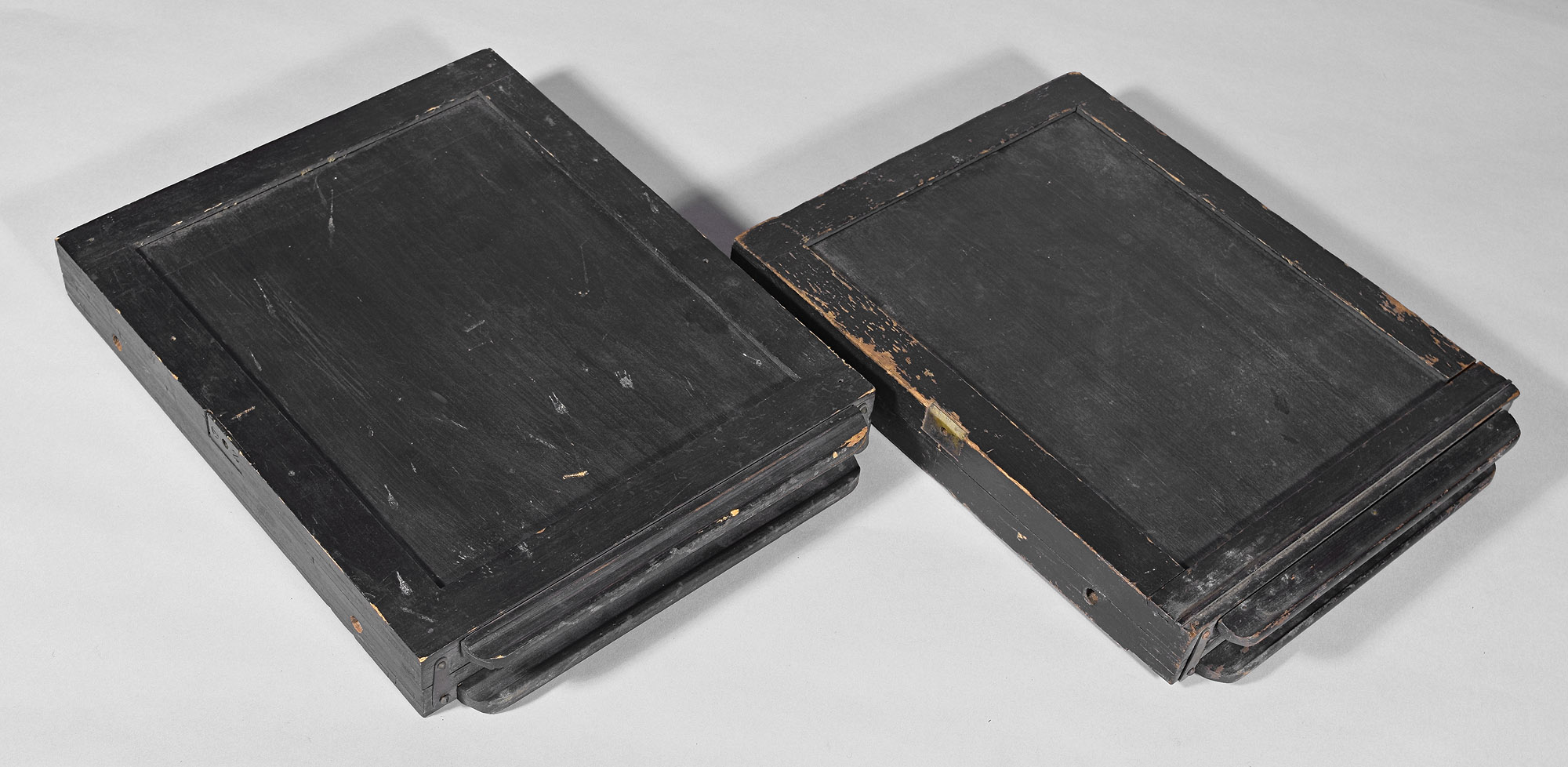
Three brown-stained plate
holders, part of the six that came with this camera. These load
right through the front and back sides by pushing a plate edge into a
spring-loaded slot at the end of a holder, dropping the other end in,
and letting the spring hold the plate in place. These holders are
only slightly over ¾ inch thick. Manufacturer: American Optical Co. New York, NY
factory Scovill
/ American Optical made a number of of cone or tapered bellows cameras.
The following is an excerpt from
American Optical/Scovill Back Focus Tapering Bellows Field View Cameras
- Chronology and Design detailing the history of
Scovill/American Optical camera models of this basic type. References:
Back to American Optical
Co. / Scovill Mfg. Co. (alphabetical)
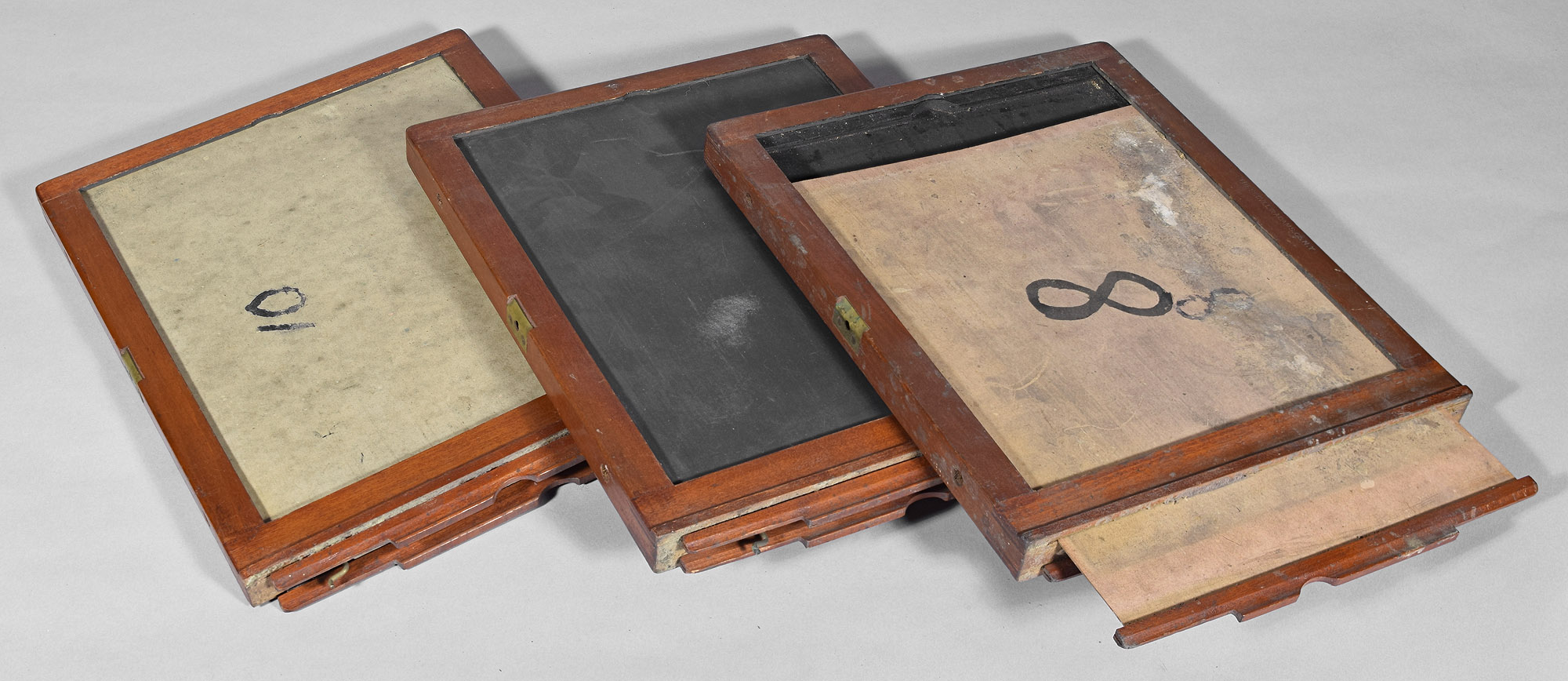
Date Introduced: ; Years Manufactured:
c.1885
Construction: rear
focus via push-pull; single or double swing;
reversing by removable back; three-piece lens board
Materials: mahogany body; cherry base;
black fabric bellows; brass hardware
Sizes Offered: at least
8x10
Notes:
Acme Reversible Back View Box / Back Focus Cone View Camera
Model Variations:
The Acme View Camera can be found in catalogs and advertising
approximately from 1884 through 1895, although there was a similar
Scovill tapered bellows view camera during the wet plate era (see
American
Optical New Camera Box). Depending on the catalog and the
year, the Acme was referred to as one of at least three names: Acme View
Camera, Back Focus Cone View Camera, or Reversible Back View Camera.
Despite its workmanlike design, it was highly finished, showing French
polish on the wood, draw file finish on the hardware, and screw slots
that were laboriously aligned along the length of each brass part then
filed down perfectly even with the part.
During the Scovill Mfg.
Co. era (<1889), sometimes this model's labels read: "American Optical
Co., - Scovill Mfg. Co., N.Y. Prop't'rs" but sometimes they read simply
"Scovill Mfg. Co., N.Y.". During the Scovill & Adams Co. era
(1889-1901), the labels merely read: "The Scovill & Adams Co. - New
York". Despite the relatively consistent high quality construction and
appearance, it is probable that the ones labeled American Optical were
manufactured in the New York City factory of American Optical, and those
labeled Scovill or Scovill and Adams were manufactured in the New Haven,
CT factory formerly the Samuel Peck & Co. factory.
So far, four
variations have been seen:
Acme
Reversible Back View Camera Variation 1.0: This is the
camera as shown in the advertising, including a ~2" thick removable,
reversible back. To take a photograph, the back's ground glass frame is
slid out and replaced by the plate holder. All examples are marked
Scovill or Scovill & Adams, and therefore thought to have been made in
Scovill's New Haven, CT factory, formerly the Samuel Peck & Co. factory.
Acme
Reversible Back View Camera Variation 1.5: This variation,
being represented by only one example so far, is identical to Variation
1.0 except that it has rack and pinion focus rather than push-pull
focus.
Acme
Reversible Back View Camera Variation 2.0: This variation
also has a removable, reversible back, but it also has an interior
ground glass frame that is released via a lever. The plate holder would
then be inserted into the hole vacated by the ground glass frame. This
variation is assumed to be c.1885, since this same back is pictured in
1885 advertising for the
American
Optical Ripley Camera. It may, therefore, be the first
variation of the Acme chronologically. But why then would the
advertising engraving show the Variation 1.0, above. I believe that
Variation 2.0 was a very short lived, expensive to produce version of
the Acme, the Variation 1.0 being the original version made before
Variation 2.0, but also made after Variation 2.0 well into the Scovill &
Adams era.
Acme
Reversible Back View Camera Variation 3.0: This variation
has yet a third variation of removable, reversible back, which, in this
case, has spring back that, unlike the other variations, does not have
to be removed to insert a plate holder - a very handy improvement. It
has a complex set of four springs that can be set open, allowing the
plate holder to be easily slid under it, then released to tightly hold
the plate holder in place. This type of back is also seen in other high
end American Optical cameras of the Scovill & Adams Co. era, such as the
Compact
View Variation 1.0, the
Compact
View / Irving View Variation 2.0, the
Elm City
View, the
Irving
View Variation 1.0, the
Irving
View Variation 1.2, and the
Star View
Camera.
American Annual of Photography and Photographic Times Almanac for
1896, The Scovill & Adams Co., 1895, ads
p. 69 ("a new camera)
American Annual of Photography and Photographic Times Almanac for
1897, The Scovill & Adams Co. (New York, NY),
1896, ads p. 67 (still "a new camera")
American Annual of Photography and Photographic Times Almanac for
1898, The Scovill &
Adams Co. (New York, NY), 1897, ads p. 70
(still "a new camera")
American Annual of Photography and Photographic Times Almanac for
1899, The Scovill &
Adams Co. (New York, NY), 1898, ads p. 60
(still "a new camera")
George Murphy (New York, NY) Catalog, April 1898, p. 20 (as the
Eagle Reversible Back View Camera)
American Annual of Photography and Photographic Times Almanac for 1900,
The Scovill & Adams Co. (New York, NY), 1899, ads
p.
89
